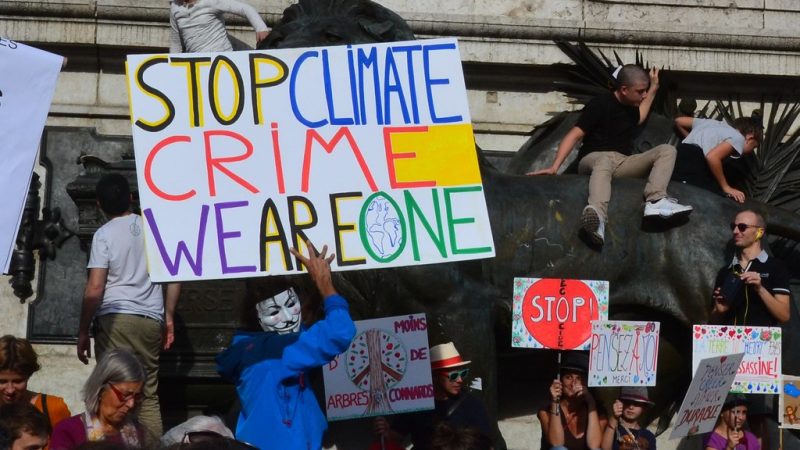The fossil fuels giants will sell the oil and gas to the highest bidder – and the global price will be the price we all pay should it make its way into our energy system.

A day of infamy, the day Rishi Sunak “jumped the shark”, when the UK Prime Minister chose the profits of oil and gas multinationals over the wellbeing of the nation using justifications so weak and transparently cynical that they might even make Donald Trump blush; There could be many ways in which the future looks back at July 31, 2023 in the UK.
The standout announcement of the day was undoubtedly the plan to “max out” oil and gas extraction in the North Sea, to go for full throttle on a planet aflame, with record temperatures at land and sea, and frightening low ice levels at the poles. But that was only part of the story.
Also shining out was a front page on the Financial Times pointing out how the government had chosen to cut the carbon price, encouraging energy-intensive industries to emit while actively discouraging investments that could clean up their act.
And a further Westminster power grab, on the trail of so many others, to try to prevent local government running low traffic neighbourhoods, a measure not primarily for climate, but public health.
This was political cynicism on a grand scale, with demonstrably inaccurate claims being repeated again and again – including by journalists and commentators who really should know better. All of this in a clear attempt to cement in the minds of a segment of voters the image of the Conservative Party as the “anti-Green” party.
This at a time when the UN Secretary General warns that the world is “boiling”, when the International Energy Agency says the world cannot afford new oil and gas projects if there’s any hope of keeping global temperature rises below 1.5 degrees.
The lead claim was that new oil and gas was essential for energy security; Mr Sunak even suggesting this would reduce the dependence on “enemy states” – when about three-quarters of our gas comes from Norway (hardly fitting that description last time I looked). Even before the invasion of Ukraine only 1 per cent was from Russia, the target the Prime Minister presumably had in mind with those words.
Yet the clear route to energy security – and affordable energy for households hard pressed by the cost-of-living crisis – is renewables, particularly onshore wind, for which the government has yet to clear the way after a lost decade of pandering to Ukip and Brexit Party voters by effectively banning them, and solar panels – with houses still being built today without what should be the most basic of provision. Plus energy efficiency, for the cleanest, greenest, and cheapest energy is that that is not being used to heat inadequately insulated, drafty, outdated homes – which are also still being built today.
Mr Sunak repeated a long-debunked claim that new drilling would produce “cheaper” energy – when what’s costing us big now is the failure to install the renewables that would be the genuinely cost-effective option. The fossil fuels giants will sell the oil and gas to the highest bidder – and the global price will be the price we all pay should it make its way into our energy system.
And there was a claim that this would be “lower carbon” oil and gas. Yet creating new fields – which even if they go ahead would take years to come on stream – is putting more supply into the system, and the comparison with liquified LNG from Qatar belies again the predominancy of Norway in our supply chain, a state that, using similar geology to ours, actually has a considerably cleaner production system.
Then there’s carbon capture and storage – another great con. Rather than digging up the carbon stored tens of millions of years ago by nature, then expensively using government funds to put it in the ground, we should just be leaving it there, for free. The government funding of the attempted clean-up of fossil fuel company emissions was being labelled by many as “greenwash”, but really better described as “hogwash”. This technology has never been used at this scale, and anyway could only potentially capture a tiny fraction of the new emissions proposed.
Transparently behind this all was political calculation – an interpretation of one by-election result, that in the constituency of Uxbridge, where the extension of London’s Ultra Low Emission Zone (ULEZ) was undoubtedly a factor, but a far from simple one. Opposition to the ULEZ extension probably brought out some voters, but how many stayed away when the Labour Party wobbled – yet again – as it has wobbled on so many issues, abstained on so many parliamentary votes, when facing opposition to a far-from-radical policy, the policy of the Labour mayor of London? This in a seat that has stayed Conservative for decades, even in the Blair landslide of 1997.
To reach hundreds of thousands of new readers we need to grow our donor base substantially.
That's why in 2024, we are seeking to generate 150 additional regular donors to support Left Foot Forward's work.
We still need another 117 people to donate to hit the target. You can help. Donate today.



